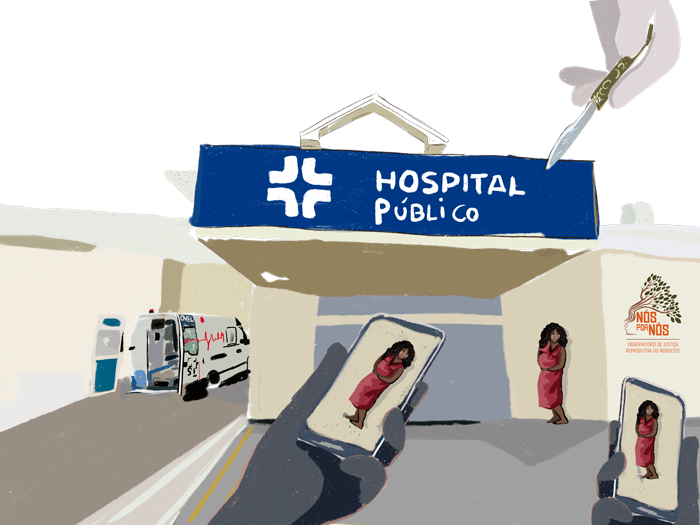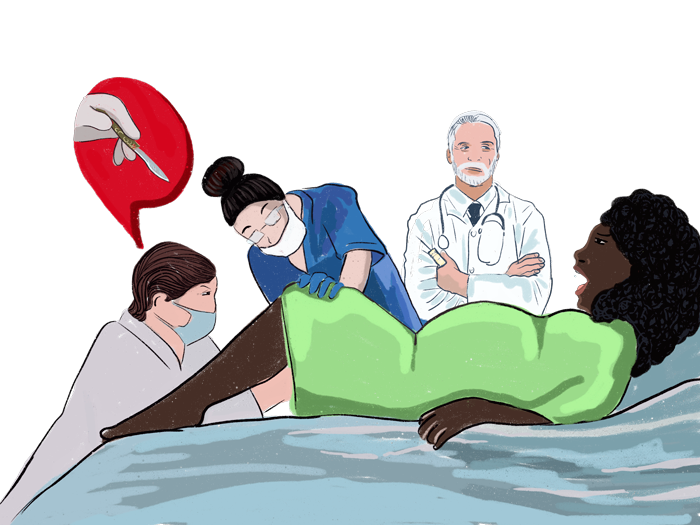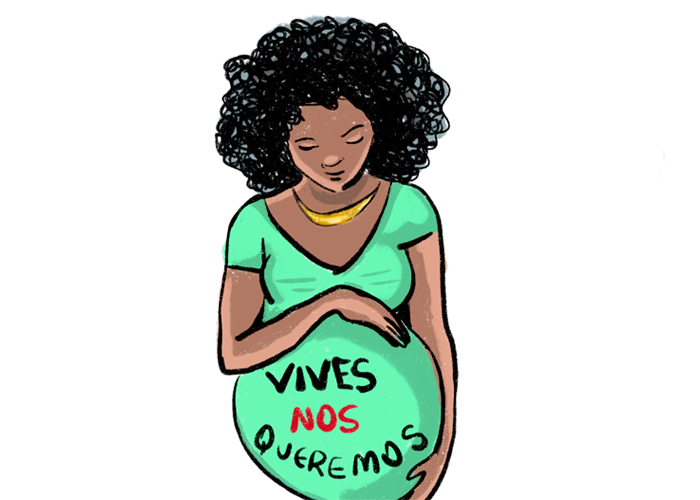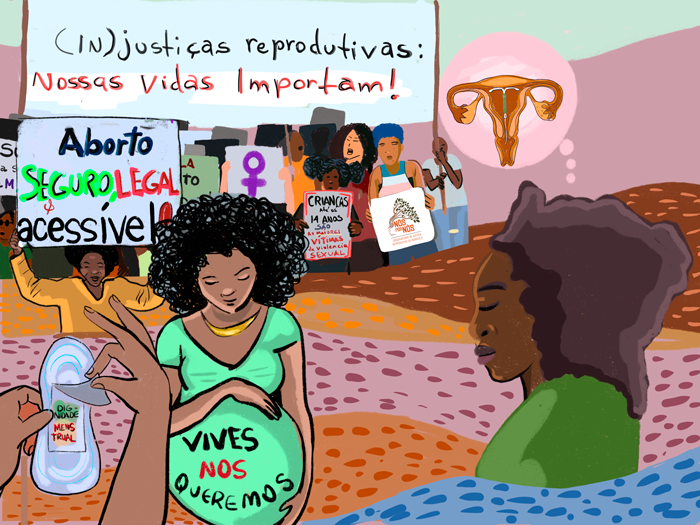History of Reproductive Justice in the Northeast
The timeline of Nós por Nós - Observatory of Reproductive Justice of the Northeast presents historical milestones and important instruments for combating racism, promoting and defending human rights, especially sexual rights and reproductive rights for young people and black women in Brazil. In this collective space, we are outlining through time the memory of the participation and impact of many black Brazilian revolutionaries and insurgents at local, state, national, regional and global levels, for the consolidation of Reproductive Justice in the Northeast Region and in Brazil.

Comprehensive Women's Health Care Program
The Comprehensive Women's Health Care Program was created with the aim of contributing to the reduction of maternal morbidity and female mortality in Brazil, especially from preventable causes, in all life cycles and in different population groups. The Program must act without discrimination of any kind and must expand, qualify and humanize comprehensive care for women's health in the Unified Health System (SUS). It is important to highlight that, for black women, the creation of the Program presented perspectives for thinking about issues associated with health, contraception and family planning, key points regarding women's health.


Creation of the Center for Research and Assistance in Human Reproduction (CEPARH) in Salvador (BA)
The Center for Research and Assistance in Human Reproduction (CEPARH) was created in Bahia, directed by the doctor Elsimar Coutinho, who used racist advertising pieces, such as the “Manufacturing Defect” campaign, to illustrate the need for birth control, demonstrating how The project of mass sterilization of black women has always been justified in history by the need for family planning as a strategy. CEPARH campaigned on birth control from a eugenic perspective. Check out more information:


Citizen Constitution/Creation of the Unified Health System (SUS)
Until 1988, health was not recognized as a public right. The Unified Health System (SUS) was established by the Federal Constitution of 1988, and derives from article 6 – which recognizes health as a social right. This is a relevant milestone to strengthen access for poor and black populations to health services. It is noteworthy that the defense of the SUS has always been one of the banners of black women's movements, aiming to strengthen their fight for sexual and reproductive rights and women's health as a whole.


“Declaration of Itapecerica da Serra” (Reproductive Rights of Black Women)
The Declaration of Itapecerica da Serra” was created as a result of the 1st National Seminar on Policies and Reproductive Rights of Black Women, in August 1993, held by Geledés - Instituto da Mulher Negra, which brought together around 55 leaders of black women's movements, feminists , Universities, the public service and Parliament. The Seminar was held in the context of preparation for the International Conference on Population and Development, in Cairo, held in 1994. It is noteworthy that the Declaration constitutes a milestone for the movement of black Brazilian women.

Conference on Population and Development (CIPD - Cairo/1994)
The United Nations Conference on Population and Development (ICPD) took place in Cairo, Egypt, in 1994. The ICPD Program of Action, adopted by 179 Member States, sets out a far-reaching plan to promote human well-being, which places the human rights of individuals, rather than numerical population targets, at the center of the global development agenda. The Action Program emphasizes the value of investing in women and girls as a key to improving the quality of life for all. And it affirms the importance of sexual and reproductive health, including family planning, as a precondition for women's empowerment, in addition to calling for an end to gender-based violence.
IV World Conference on Women (Beijing, 1995)
The Fourth United Nations Conference on Women was held in Beijing, in September 1995, and was one of the most important conferences to reflect on the need for conceptual and programmatic advances in promoting the situation of women. The Beijing Conference began with an assessment of the progress made since previous conferences (Nairobi, 1985; Copenhagen, 1980; and Mexico, 1975) and an analysis of the obstacles to be overcome so that women can fully exercise their rights and achieve their development integral as people. The Beijing Platform for Action presents twelve strategic areas for equality and to avoid discrimination, mainly in the field of sexual health and reproductive health.
Family Planning Law (Law 9,263, of 1996)
The Family Planning Law (1996) establishes that people over twenty-five years of age or, at least, with two living children and with the authorization of their husband/wife can undergo the tubal ligation or vasectomy procedure. It is noteworthy that the legislation prohibits any type of demographic control and begins to regulate the use of sterilization.

Millennium Development Goal
The Millennium Development Goals (MDGs) are the eight international development goals for the year 2015. The goals were established after the United Nations Millennium Summit in 2000, when the Millennium Declaration of the Nations was adopted. United. At the time, the 191 member states committed to helping achieve the MDGs. It is important to highlight that, among the objectives, are the promotion of gender equality and the improvement of maternal health. Black women's organizations have strengthened their influence at national and international levels so that the commitments made internationally by Brazil are implemented.


Creation of the Articulation of Brazilian Black Women's Organizations (AMNB)
Founded in September 2000, AMNB was born in a period of great strengthening of the expression of Brazilian black movements. At this time, black movements from all over the world were organizing themselves to participate in the III World Conference against Racism, Xenophobia and Related Intolerance, which would take place a year later, in September 2001, in Druban, South Africa. It was then that three black organizations black women, Criola, from Rio de Janeiro, Geledés – Instituto da Mulher Negra, from São Paulo, and Maria Mulher – Organization of Black Women, from Rio Grande do Sul, called on black women's organizations across the country to found the first articulation of black women's organizations at national level, and to be present and lead Brazil's participation in the Durban Conference.

World Conference to Combat Racism, Racial Discrimination, Xenophobia and Related Forms of Intolerance (Durban -2001)
The III World Conference to Combat Racism, Racial Discrimination, Xenophobia and Related Intolerance took place between August 31 and September 8, 2001, in Durban, South Africa, with the objective of agreeing on an action program, in order to guide countries signatories in promoting actions aimed at combating racism, racial discrimination, xenophobia and related intolerance. The conference brought to the public debate the record that a single individual, or group, due to their racial condition, color, origin, language, religion and other characteristics, can suffer multiple or aggravated forms of discrimination.
Prenatal and Birth Humanization Program
Historically, there has been an inadequacy in prenatal care and health care for black women, who remain at a disadvantage when compared to health care for white women. Black women carry a set of negligence in their pregnancy history as a result of institutional racism in public service institutions. In this sense, it is necessary that the Prenatal and Birth Humanization Program, established by the Ministry of Health through Ordinance/GM no. 569, of 06/01/2000, remains aligned with its central commitment to ensuring improved access , coverage and quality of prenatal care, childbirth and postpartum care for pregnant women and newborns, from the perspective of citizenship rights to reduce inequities and deaths among black women.
Maternal Death of Alyne Pimentel
On November 11, 2002, Alyne da Silva Pimentel Teixeira, 28 years old, black, poor and pregnant, went to Casa de Saúde Nossa Senhora da Glória, a private health clinic in Belford Roxo, in the state of Rio de Janeiro. Despite showing symptoms of a high-risk pregnancy, the doctor who provided care sent her home. However, her symptoms worsened over the next two days, so she returned to the clinic. At this point, doctors were no longer able to detect a fetal heartbeat. Her labor was induced six hours later, resulting in a stillborn fetus. Surgery to extract the placenta took place fourteen hours later. Due to the fact that Alyne's health was deteriorating rapidly, she had to be transferred to a more specialized public health service, but she still had to wait more than eight hours to be transferred to the General Hospital of Nova Iguaçu. Alyne died after more than 21 hours without receiving medical assistance. She left behind a five-year-old daughter.

Special Secretariat for the Promotion of Racial Equality and the Secretariat for Policies for Women
The Special Secretariats for Policies for Women and the Promotion of Racial Equality were created based on the demands of the black women's, black and feminist movements, and present guidelines for national policy for women from the perspective of gender and racial equality in Brazil . From these structures, women's conferences and the promotion of racial equality were held, which led to the creation of the National Policy Plan for Women (PNPM) and the National Plan for the Promotion of Racial Equality (PNAPIR). It is noteworthy that the PNPM approved in 2013-2015 defined in its chapter nine the Confrontation of racism, sexism and lesbophobia. In this context, it is also important to highlight the creation of the National Councils for Women and the Promotion of Racial Equality, constituted with the presence of civil society, as a strategy for social control.


National Policy for Comprehensive Attention to Women's Health and Technical Committee on the Health of the Black Population
The National Plan for Comprehensive Attention to Women's Health was created by the Ministry of Health with the support of the black women's movements, black and feminist movements and incorporates the gender approach, integrality and health promotion as guiding principles, and seeks to consolidate the advances in the field of sexual and reproductive rights, with an emphasis on improving obstetric care, family planning, unsafe abortion care and combating domestic and sexual violence. The Technical Committee for the Health of the Black Population was created by ordinance no. 1678 and 2632, both from the Ministry of Health, with the aim of monitoring the implementation of the National Policy for Comprehensive Health of the Black Population, which became law in 2009. It is noteworthy that in this process black organizations and black researchers in the area developed a set analysis to reinforce the emergence of the creation of the Comprehensive Health Policy for the Black Population in the country. Check out more information:


Program to Combat Institutional Racism
The Program to Combat Institutional Racism (PCRI) is an initiative that aims to identify, recognize and combat discriminatory and prejudiced practices within institutions, whether governmental, private or in the third sector. Its objective is to promote racial equality by eliminating barriers and promoting policies and actions that guarantee fair and equitable treatment for all people, regardless of their ethnic or racial origin. This program is fundamental to confronting systemic racism and its harmful consequences for society.


National Comprehensive Health Policy for the Black Population
The National Policy for Comprehensive Health of the Black Population (PNSIPN) is the result of a historical demand from black women's movements and the movement in Brazil in the face of inequalities impacted by institutional racism in health, which for many centuries neglected studies and research related to prominent diseases of the black population and the recognition of the living conditions of this population, a result of the social, cultural and economic injustices present in the history of Brazil. It is important to highlight the role and importance of black women's organizations in analyzing racism as a determining phenomenon in the health-illness-care process. It was based on this perspective that the black women's movement demanded reformulations in debates, public agendas and health policies based on strategies for the social control of the SUS and for the legitimization of the PNSIPN.


Racial Equality Statute
The Racial Equality Statute was established by Law no. 12,288, in 2010. In its 65 articles, composed of four thematic axes, it presents provisions that determine what is understood by racial inequality, ethnic-racial discrimination, among other concepts listed. . In its article 6, the Statute reinforces that the SUS must guarantee equal, universal access without ethnic distinction, aiming for more specialized care, as well as accessibility of information and communication, understanding the specific needs of this population.


Creation of the Cegonha Program
The Cegonha Program, created in 2011, within the scope of the Ministry of Health, is a package of actions to guarantee quality, safe and humanized care for all women. One of the objectives of the Program refers to reducing maternal mortality in Brazil - a phenomenon that affects young black women and women in large numbers -, as well as working to promote and implement care for women's health and children's health, with focus on care during labor and birth.

Committee on the Elimination of All Forms of Discrimination Against Women (CEDAW/UN) condemned Brazil for the death of Alyne Pimentel
Alyne Pimentel's case became known throughout the country and internationally for its astonishing severity, which exposed the reality of maternal mortality among black women in Brazil. This is the first case on maternal mortality judged by international human rights bodies, which held the Brazilian government responsible for preventable maternal death. It is worth highlighting that Alyne Pimentel's case led to the forced advancement of the recognition of reproductive rights in Brazil, the Latin American region and the world. An especially important case for the recognition of women's rights to safe motherhood and non-discriminatory access to quality basic health services. After 12 years, compensation was ordered to be paid to Alyne Pimentel's mother, as a reparatory measure, by the Committee on the Elimination of All Forms of Discrimination Against Women (CEDAW/UN)l.

The law on abortion was changed by the Federal Supreme Court in 2012, when induced abortion of anencephalic fetuses became legal
In April 2012, the Federal Supreme Court (STF) decided that the pregnant woman has the freedom to decide whether to terminate the pregnancy, if, through a medical report, the fetus is found to have anencephaly - a condition characterized by the partial absence of the brain and cap. cranial. It is noteworthy that in the Brazilian reality, legal abortion is a complex issue, which causes great difficulty in access and doubts for women, particularly young, black and poor women, who represent the largest number of women who die as a result of illegal abortion.

Creation of the Northeast Black Women's Network
The Northeast Black Women's Network (RMNN) was created on April 27, 2013, with the aim of strengthening the voices, narratives, articulation, denunciation and political influence of black women in the region and in order to combat racism, machismo, LesBiTransphobia and including black women in the development cycle of the Northeast. The RMNN was created based on the methodologies established by the Brazilian black movement in the 1980s, whose principle was to enhance insurgencies based on regional realities and contexts. The RMNN was designed and created by Odara - Instituto da Mulher Negra (BA), in conjunction with Bamidelê (PB), Grupo de Mulheres Negras Mãe Andresa (MA), Ayabás - Instituto da Mulher Negra do Piauí (PI) and many others organizations in the region that, together, announced the new call to black women to enhance political organization in the Northeast.
Montevideo Consensus on Population and Development
Brazil was among the 38 countries that signed the Montevideo Consensus on Population and Development, on August 16, 2013. The document deals with the implementation of population and development issues and formatted more than 120 measures on eight issues identified as priorities to give follow-up to the Program of Action of the United Nations International Conference on Population and Development (ICPD), held in Cairo (1994). Among the themes identified as priorities, four directly discuss the issues of Sexual Rights, Reproductive Rights, Reproductive Justice and Defense of Women's Lives.

Decade of People of African Descent (2015 - 2024) and Sustainable Development Goals (2015 - 2030)
In 2015, the UN General Assembly proclaimed the period between 2015 and 2024 as the International Decade for People of African Descent, recognizing that the human rights of Afro-descendant populations need to be promoted, recognized and protected. Presenting the need for the United Nations and its member states to take effective measures to implement the program of activities for recognition, justice and development. The Sustainable Development Goals (SDGs) refer to the 17 global goals, established by the United Nations General Assembly. Among them, goal 5 of Gender Equality stands out, which aims to achieve gender equality and empower all women and girls. Check out more information:

March of Black Women Against Racism, Violence and for Good Living
The March of Black Women Against Racism, Violence and for Good Living took place on November 18, 2015, in Brasília, with the presence of more than 100 thousand black women, and became one of the most important milestones in the struggle of black women in Brazil. The strengthening and expansion of black women's organizations across the country and the creation of the Black Women's March Charter 2015 are considered a result of the Black Women's March, which calls on Brazilian society to consolidate a new civilizing pact centered on Good Living. The Charter document denounces the myth of racial democracy, the need for sexual and reproductive rights policies and the harmful processes of sterilization of black women.

Zika epidemic in Brazil, beginning of the debate on Reproductive Justice
Studies indicate that the Zika virus arrived in Brazil in 2014 - the same time that the Chikungunya virus emerged in the country - and took on alarming proportions in 2016. The Zika epidemic in Brazil, fundamentally, affected black women in the Northeast region of the country. , this is because the largest mosquito infestations occur in regions where the lack of basic sanitation and the need to store drinking water create a favorable environment. Zika raised important debates, such as: racism, poverty, regional inequalities, control, regulation, abortion and women's reproductive rights. Check out more information:


Hearing on abortion at the STF
In 2017, the Allegation of Failure to Comply with Fundamental Precepts (ADPF) 442 was the subject of a hearing at the Federal Supreme Court (STF). The ADPF intends to decriminalize voluntary abortion up to the third month of pregnancy. This allegation of non-compliance with a fundamental precept would be scheduled for judgment, in 2022, by the STF.


Covid-19 Pandemic - First case of maternal death due to Covid was a young black woman from the interior of Bahia
In Brazil, the Covid-19 pandemic had a devastating impact on the most vulnerable groups in society. Violations promoted by the intersections of race, gender, class and territory have increased inequities, misery and death in a brutal way for racialized groups, especially for black women in the poorest regions of Brazil, such as the Northeast and the Amazon , where thousands of black women do not have access to housing, basic sanitation, work, income, education and water.

New law (14,443/2022) on Family Planning
It reduced the minimum age for men and women for voluntary sterilization to 21 years and ended the requirement for the spouse's consent to undergo tubal ligation and vasectomy.










